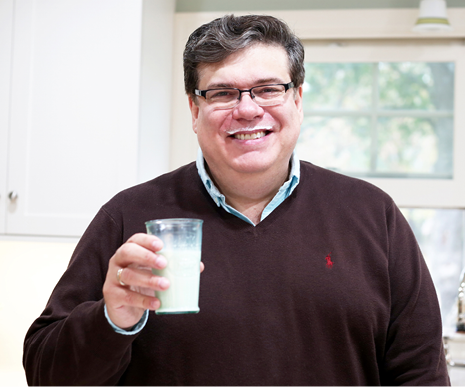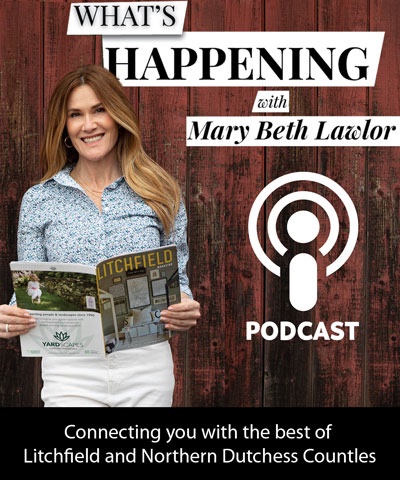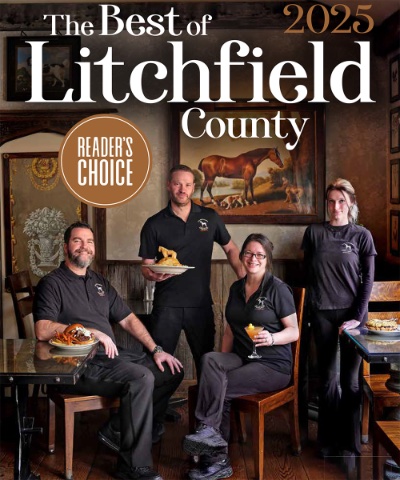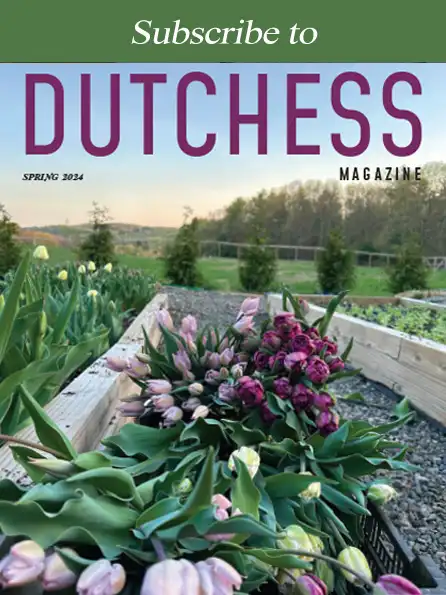November 1, 2013
David Leite’s irreverent, wildly informative, and laugh-out-loud funny
food website, LeitesCulinaria.com, is Roxbury’s delicious secret.
Poke around food writer, cookbook author, and web site publisher David Leite’s Roxbury house long enough, and you may bump into a duck prosciutto hanging from a rafter as it cures, a just-delivered Bradley meat smoker sitting in the foyer, and, on a basement shelf, alongside a vintage Sunbeam MixMaster, a box crammed with James Beard medals and other awards Leite has received over the years for his print and online storytelling (“I just don’t need to display them anymore,” he says). On this particular Sunday, a lemon-curd cake has just been sprung from the oven of Leite’s newly remodeled kitchen, and, if he can figure out how to work his hotshot coffeemaker, a midafternoon nosh is about to be served.
There’s a story behind that lemon cake, of course (more on that later). Because for David Leite (“rhymes with ‘eat’”), there’s a story behind most things, and he’s the man to tell it. Leite’s Culinaria, the now internationally successful website he founded back in the Internet’s “stone age,” in 1999, is, he says, the “world according to me.” David’s World is not to be confused with “Wayne’s World,” or the melancholy Andrew Wyeth painting “Christina’s World.” There, there are no references to events called Gritsapalooza, code name for a gathering of the core LC staff in Charleston, South Carolina, where a cocktail dubbed the Fatty Daddy was born in his honor. And only in David’s world are there recipes for his Portuguese grandmother’s chicken soup, and an image of homemade ketchup that might be mistaken for a CSI blood spatter.
His world is a microcosm of all things edible, starting with Leite’s original recipes, along with those that his editor-in-chief, Renee Schettler Rossi, curates from published cookbooks, the renowned and the unsung. Beth Price directs the 150-plus freelance team that puts the recipes through their paces, testing and retesting them, and winnowing them down, says Leite, “to the best of the best.” Each one is accompanied by knowing, detailed “LC Notes” from the team about ingredients, methods, and tips, provided in a tone that mixes “just between us” coziness with John Waters–worthy asides (“You there—the one with the drool starting to pool on your keyboard from the very notion of these crisp cracklins.”). Leite’s Culinaria staff also includes Julia Dreyfoos, who manages production, and Dan Kraan, the Community Moderator for the site.
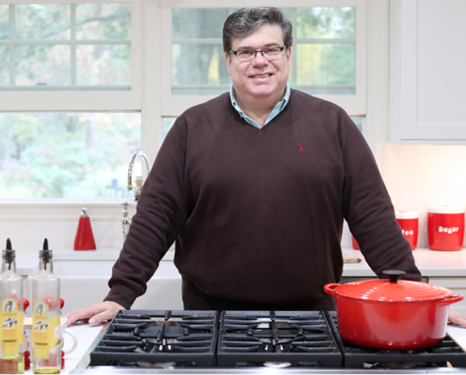
And then there’s the site’s “David Blahg,” Leite’s ruminations on everything from adventures in cooking a Christmas goose to “Waving My Potato Freak Flag,” a spud-fanatic’s confessional, complete with a recipe for potato-bacon pizza. And it includes podcasts (his own, as well as segments he does with American Public Media’s “The Splendid Table,” and niche categories such as cooking essentials (The Arsenal), indulgence foods (Eating Dirty), and even a family go-to-recipe collection (Mom 911).
Running the whole show from Roxbury these days, Leite and his life partner (who he calls The One, in his writing) have had a home in the Northwest Corner since 1997. “I drive around with a smile on my face,” Leite says. “I can’t believe I live in this beauty.” On any given day, he may be driving around to pick up pastured beef and poultry from Greyledge Farm or Ox Hollow Farm, or paying a call on Paul the butcher at New Morning Market, in Woodbury. He adores the vegetables from the ‘Organic Mechanic’, the old Roxbury Automotive Garage, where you can fill your tank and buy produce from Riverbank Farms, and, he says, Maple Bank Farm is another great source. And if his smile is bigger on the nights he’s driving home from Washington restaurant Community Table, it’s because, he says, “Joel Viehland, the chef … he’s a genius.”
Leite claims that “the chatter of Manhattan stops here,” but every Tuesday there’s plenty of chatter of another sort going on: Leite spends the day with the person he calls his “Connecticut food buddy,” Mamie Keys, of Roxbury’s Mamies Restaurant, on her day off, playing and experimenting in the kitchen. “We’ve made bacon and homemade sausage, we’ve made corned beef. Over at the restaurant we bake the lemon curd cakes that she sells on weekends,” Leite says. (They’re also available by special order through Mamie’s.)
So… about that cake. Without being too Proustian about it, it was that taste of cake batter that led Leite, former Manhattan ad man and student of psychotherapy, toward the kitchen. Upon the death of his grandmother Costa—the woman who, with his parents and godmother—had seen him through the best and worst of growing up in Fall River, Massachusetts—Leite realized that as the older generation passed, so would all those recipes that had made his extended Portuguese family special. And when, one night, his partner was baking a cake, Leite, who typically made a dinner of a bowl of Fiber One cereal, had a taste of the batter and, like that good old French madeleine, it brought a rush of emotions with it. “I was 34 at the time, and had memories of my grandmother cooking but not baking much,” the now-53-year-old Leite says. “I remember helping her cook as a kid—she pulled one of those old chrome-legged chairs over to the stove. She put my grandfather’s workshirt on me backwards and rolled up the sleeves, like a smock. And I just stirred. There was this big radio, with little knobs that looked like Kraft caramels, and she sang to the Portuguese music. But bake? I called my mother and asked, ‘Did vovó bake?’ And she said, ‘Don’t you remember? She used to bake cakes all the time.” Without looking back, Leite set out to preserve the family recipes, and fell in love with baking. “To this day, I make that lemon cake, and the batter tastes like my grandmother’s cake used to taste.”
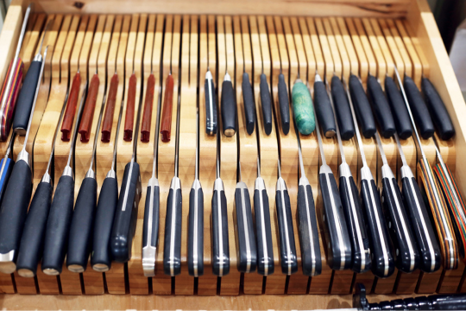
What began with Leite scurrying around his mother’s Massachusetts kitchen, videotaping her making the Portuguese classics (she was too fast for him to follow her instructions with a pad and pen), eventually became his story “Devil with a Red Apron On.” He and The One went to the Azores (where Leite’s grandparents were from) and mainland Portugal (eating voraciously and, he says, “crawling on our bellies while seeing Lisbon”). There he found food that may have had the same names as the dishes he’d eaten back in Fall River, but were completely different. “Take torresmos,” he says. “To us, that was pork chunks that had been marinated in crushed hot pepper, tossed in oil, then roasted and sliced. But in mainland Portugal, torresmos are cracklins. I foolishly thought, You people are WRONG! It was humbling to realize I had seen the food of my family’s country through a very narrow slit in the fence; being in Portugal allowed me to see so much more.” In 2009 came the publication of his The New Portuguese Table, which, with a nod to the classics, “freshened up” recipes, he says, and gave a glimpse of what was happening with Portuguese food now. At press time, Leite is working on a second cookbook, Leite’s Eats—featuring DL’s favorites.
From word one, Leite broke the rules for new writers, doing personal, irreverent pieces in the first person when most editors were adamant about taking the more distant, third-person approach. He launched his Leite’s Culinaria website when pretty much no one but Epicurious and a few others were in the game. “I love the intimacy and immediacy of the Web,” he says of the 24/7 back-and-forth with his 8 million site visitors and 25,000-plus Twitter followers. “I found a home.” His early chutzpah got him noticed by Barbara Fairchild, then editor-in-chief of Bon Appétit magazine, who helped get him his first big magazine gig, a story about coveting a big old Viking stove (and leading soon to a story on returning to Portugal). Yet, freelance writing being what it is, despite award-winning stories for the likes of the New York Times, and appearances in annual volumes of Best Food Writing, he was broke.
“I had a decade of debt,” he says, “and thought about going back to advertising. But in 2009 I started getting ads for my website, and the thing went from zero to sixty in seconds.”
Breaking those rules about writing so personally (as well as Tweeting and posting photos of everything from homemade bacon and eggs to a shot of himself caught in a Manhattan traffic jam on Instagram) has finally paid off. “But,” says Leite, “as I told my writing students all the time, ‘You’ve got to be funny enough, bitchy enough … outrageous enough to write in the first person. I’m not afraid to reveal my foibles. I’m a good cook, but I’m a great baker. People have heard that I’ve almost burned down this house. I have no problem letting people know how I’ve screwed up.”
You can read David Leite’s “blahg” and visit his web site at
www.LeitesCulinaria.com, listen to his pod casts at
http://leitesculinaria.com/category/audio, follow his tweets at twitter.com/davidleite, or buy his cookbook at
www.amazon.com/New-Portuguese-Table-Exciting-Flavors/
